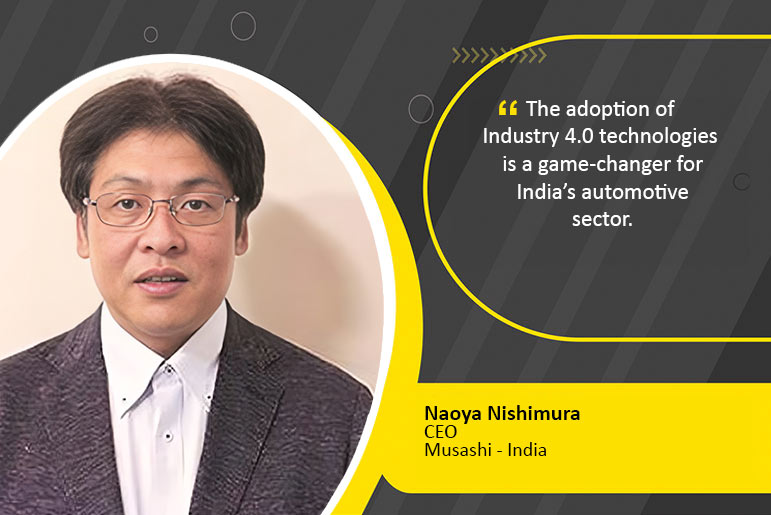India stands at the cusp of a manufacturing revolution, with its automotive sector driving unprecedented growth and innovation. As a leading player in the global automotive components industry, India is harnessing cutting-edge manufacturing technologies to enhance productivity, boost competitiveness, and contribute significantly to the country’s economic expansion. The rise in demand for both internal combustion engine (ICE) vehicles and electric vehicles (EVs) is transforming the landscape, providing new opportunities and challenges for manufacturers.
According to the Automotive Component Manufacturers Association (ACMA), India’s automotive component industry has witnessed a robust 9.8% growth in turnover for the financial year 2023-24. This increase is largely driven by a 9% rise in vehicle production and sales, spanning both ICE and EVs. The sector is now poised to contribute 5-7% to India’s GDP, reflecting its crucial role in the economy. Additionally, it is forecasted that the Indian auto component market will expand by USD 115.79 billion, with a compound annual growth rate (CAGR) of 25.7% from 2023 to 2028. This growth underscores the importance of leveraging advanced manufacturing technologies to sustain and accelerate progress.
Industry 4.0: Transforming the Manufacturing Landscape
The adoption of Industry 4.0 technologies is a game-changer for India’s automotive sector. This new industrial era integrates automation, robotics, artificial intelligence (AI), and the Internet of Things (IoT) to drive significant improvements in manufacturing processes. By embracing these technologies, Indian auto component manufacturers are achieving higher levels of productivity, quality, and efficiency.
Automation and robotics are enhancing production capabilities by taking over repetitive and precision-based tasks. This shift not only reduces manual labor but also minimizes errors and increases production speed. For example, automated systems can efficiently handle complex assembly processes, while robotics are used for tasks such as welding, painting, and parts handling.
AI and IoT technologies provide real-time data and insights that enable better decision-making and resource management. AI algorithms analyze vast amounts of data to predict equipment failures, optimize maintenance schedules, and improve supply chain logistics. IoT devices offer visibility across the supply chain, ensuring that materials and components are available where and when they are needed.
In the context of EV manufacturing, Industry 4.0 technologies play a crucial role in meeting the growing demand for advanced components like batteries, motors, and charging systems. By enhancing safety, boosting production efficiency, and facilitating data-driven decision-making, these technologies are essential for developing the next generation of EV components.
Additive Manufacturing: Revolutionizing Component Production
As technology advances, additive manufacturing, commonly known as 3D printing, is set to revolutionize the auto components industry far beyond its current use in prototyping. This cutting-edge technology will soon enable manufacturers to produce components with unprecedented design flexibility, weight reduction, and speed.
In the electric vehicle (EV) sector, 3D printing will allow for the creation of complex geometries and optimized designs that are essential for high performance. The ability to rapidly prototype will also lead to accelerated development cycles, enabling manufacturers to quickly test, refine, and bring new designs to market. Moreover, additive manufacturing is poised to play a pivotal role in achieving sustainability goals. By minimizing material waste and supporting circular economy practices, this technology will reduce costs while promoting environmentally friendly manufacturing.
Digital Twin Technology: Enhancing Efficiency and Quality
Digital Twin Technology is changing the way manufacturers design, test, and manage components by creating virtual models, or “digital twins,” of physical systems. This allows manufacturers to simulate and optimize components like batteries and electric motors before making real prototypes.
The technology also uses real-time data from the physical systems, enabling ongoing improvements and predicting maintenance needs. Manufacturers can simulate entire powertrain systems, leading to better energy management, optimized manufacturing processes, and improved quality control. By analyzing component performance, digital twins can identify potential issues early, reducing downtime and enhancing product quality.
In addition to production, digital twin technology is valuable for lifecycle management. It supports better recycling, continuous performance upgrades, and customization. It also encourages collaboration across teams, driving innovation in component design and manufacturing.
Looking Ahead: Embracing Technological Advancements
India is rapidly advancing towards becoming a global hub for automotive manufacturing. To maintain this momentum, it is crucial for the auto components sector to fully embrace and integrate advanced technologies. Industry 4.0, Additive Manufacturing, and Digital Twin Technology are essential for boosting efficiency, fostering innovation, and securing a competitive edge in the global market.
As these technologies become integral to manufacturing processes, they will significantly enhance India’s position in the automotive industry. Embracing these innovations will enable manufacturers to meet evolving market demands, improve product development, and support a technology-driven economy.
India’s commitment to adopting these cutting-edge technologies showcases its ambition to lead in the global manufacturing landscape. By setting new benchmarks in efficiency, innovation, and sustainability, the automotive sector will contribute to the country’s industrial growth and solidify its role in the future of global manufacturing.


